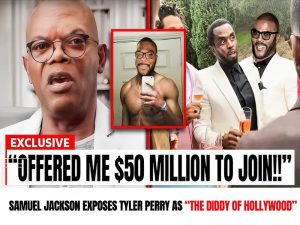Samuel L. Jackson Exposes Tyler Perry as “The Diddy of Hollywood”: A Shocking Allegation in the Film Industry

In an unexpected and bold move, legendary actor Samuel L. Jackson has allegedly called out filmmaker Tyler Perry, labeling him as “The Diddy of Hollywood” during a recent interview. This statement has stirred significant controversy, igniting debates within both the film and entertainment industries. Jackson’s remark draws a parallel between Tyler Perry and hip-hop mogul Sean “Diddy” Combs, implying that Perry, much like Diddy in the music world, holds immense power in Hollywood and may be using it in questionable ways behind the scenes.
Samuel L. Jackson’s Statement
Samuel L. Jackson, known for his iconic roles in films such as Pulp Fiction and The Avengers, is no stranger to voicing his opinion openly and directly. In the interview, Jackson reportedly criticized the inner workings of Hollywood, particularly its treatment of Black actors and filmmakers. When discussing the influence wielded by prominent Black figures in the entertainment industry, Jackson made the explosive claim that Tyler Perry, who built a media empire through his Madea films and his production company, Tyler Perry Studios, is operating similarly to Diddy, implying control, gatekeeping, and manipulation within his circle.
“Tyler’s built an empire, no doubt,” Jackson said. “But people need to see the bigger picture—how he controls the game, just like Diddy in the music industry. It’s the same playbook, and it’s keeping a lot of people locked out.”
What Does “The Diddy of Hollywood” Mean?
Comparing Perry to Diddy suggests that Perry, much like Diddy in the music industry, has consolidated tremendous power and influence. Diddy, known for his savvy business dealings and the creation of Bad Boy Records, has often been accused of exploiting artists under his label, keeping tight control over creative rights, and limiting the opportunities for those who are not part of his inner circle. Jackson’s remark suggests that Perry, with his massive influence in film and television, might be exercising similar control over Black talent in Hollywood.
Jackson’s statement implies that Perry’s vast empire—built through his films, television shows, and ownership of one of the largest film studios in the country—may be creating an ecosystem where Perry has significant control over the narratives and careers of Black actors and filmmakers. Perry has often been praised for creating jobs and opportunities for Black actors, directors, and writers, but Jackson’s comment paints a different picture, one of an industry where creative freedom is stifled for those who don’t play by Perry’s rules.
Tyler Perry’s Empire
Tyler Perry has undeniably made history with his success. He became the first African American to own a major film studio outright, and his productions have been instrumental in bringing more Black stories to mainstream audiences. Perry’s films, particularly his Madea series, have grossed hundreds of millions, and his studio in Atlanta, Georgia, has been a game-changer for Black creators.
However, despite his success, Perry has faced criticism for the quality of his films and the portrayal of Black culture in his work. Critics argue that Perry relies heavily on stereotypes and that his films lack the nuance and depth seen in other Black filmmakers’ work. Jackson’s critique adds a new layer to this, suggesting that Perry’s business model may be more focused on consolidating power than fostering diverse, creative talent.
Public and Industry Reactions
The reactions to Jackson’s comments have been mixed. Some in the industry have echoed Jackson’s concerns, suggesting that Perry’s rise to the top has indeed created an exclusive space where only a select few benefit. Others, however, argue that Perry has done more than most to uplift Black talent in Hollywood, offering roles and opportunities to those who might not have had a chance otherwise.
On social media, fans of both Jackson and Perry have debated the issue. While many support Jackson’s call for greater transparency and inclusivity in Hollywood, others defend Perry, crediting him with giving Black actors and filmmakers opportunities in an industry that has historically marginalized them.
What’s Next for Hollywood?
Samuel L. Jackson’s bold statement may reignite conversations about the concentration of power within Hollywood, particularly as it relates to Black filmmakers and the opportunities (or lack thereof) available to underrepresented voices. The comparison between Perry and Diddy raises questions about whether the same systemic issues that plague the music industry are mirrored in Hollywood, even when Black creators hold positions of power.
Whether Tyler Perry responds to Jackson’s comments remains to be seen, but the dialogue surrounding the intersection of power, creativity, and representation in the entertainment industry is likely to continue. Perry has built a legacy as a trailblazer, but Jackson’s remarks remind everyone that with power comes responsibility, especially when it comes to fostering the next generation of Black talent in Hollywood.
For now, the debate between what constitutes empowerment versus control will continue to evolve, as figures like Jackson and Perry remain central to the future of Black representation in film and media.